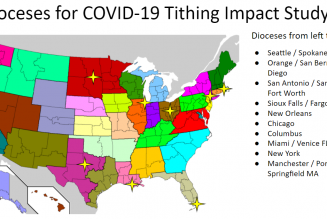By Dr. Jeff Mirus ( bio – articles – email ) | Sep 12, 2023
A very fine priest in a very fine parish recently gave a homily emphasizing love of neighbor in which he inadvertently got a little carried away when he said, in effect, the following: “It is essential for you to place the highest emphasis on loving your neighbor. You may ask me about the commandment to love God, but the only way we have to love God is by loving our neighbor.”
Now, I am convinced that this priest did not mean to emphasize love of neighbor in exactly this way. I have heard him preach often, and this is clearly contrary to his fundamental spirituality, and to his own closeness to God. Here, I believe, he slipped into a misleading rhetorical flourish. What he almost certainly had in mind was St. John’s statement that “If any one says, ‘I love God,’ and hates his brother, he is a liar; for he who does not love his brother whom he has seen, cannot love God whom he has not seen.” (1 John 4:20)
Granted that our human love is always deficient (and hopefully in a process of growth), John’s statement is certainly broadly true. If we know and love God, we will also love our neighbor. Moreover, to the degree that we fail in love of neighbor, we are also failing in love of God. Perhaps even more to the point, if we realize that in some way we are failing to love our neighbor, and we neglect to correct this, then we are choosing to set limits on our love of God, or even to deny it altogether. Finally, if we hate our neighbor, we are in that disposition seriously undermining our love for God.
But this does not mean that loving our neighbor is the only way we can love God. In fact it would seriously jeopardize our relationship with both God and neighbor if we were to fall into this trap. We should also be able to recognize that this is precisely the trap into which every secular (timebound, Godless) human culture falls as repeated failures to seek the genuine good of our neighbors become redefined as “love”. The reason this happens is that we need to be rooted in God not only as the guide to what love is, but as the very source of both our ability to love in the first place, and our ability to grow in love throughout our lives.
Loving God directly
Now, loving God directly is certainly possible for us. God is not some abstraction to whom we cannot relate personally. We know him partly because He has created us in His own image, with intellect and will. Moreover, He has revealed Himself so that we might know and love Him, and in Christ He has also adopted us as beloved sons and daughters. In fact, not only is it possible for us to love God directly, but He has also commanded us to do this as the very first instance of obedience as his creatures. When one of the scribes asked Our Lord, “Which commandment is the first of all?”, Jesus responded: “Hear, O Israel: The Lord our God, the Lord is one; and you shall love the Lord your God with all your heart, and with all your soul, and with all your mind, and with all your strength” (Mk 12:29).
It is just this deep personal challenge to love God that makes both Judaism and Christianity unique among all the religions and philosophies of the world, and it challenges us first and foremost to a life of prayer and devotion to God that precedes in importance anything else we are called to do. Here we also see the origin of the tension between the contemplative and the active life, and the truth that each of us must balance the two in accordance with our personal vocation as discerned in prayer. Of course, all contemplatives must seek to do good to others in their prayers, but it is also of vital importance that all those in the “active” life should be grounded in prayer. And all prayer should be rooted in our love of God, who loved us first.
In other words, it is not only true that we can love God “directly”, but that we are both called and required to do so as our very first priority. Moreover, a failure to do this will nearly always result in the shipwreck of both our enthusiasm and our plans for loving our neighbors. Without prayer, these will become a matter of human strength devoid of grace, which is always in some respects a form of personal idolatry and weakness. All of our love must be grounded in the love of God in order to avoid this sort of wreckage as we seek to grow in strength and perfection. Moreover, the fastest way to grow in love is by spending time with God in prayer, always strengthening our relationship of love with Him.
Pitfalls
There are, of course, potential problems in any particular emphasis in the spiritual life. These typically arise from misunderstanding and misperception, but they are even more dangerous when they are used as excuses. For example, we may fall victim to distortions in how we do “good” to our neighbors based on ideas that do not at all come from God, and we are often opened to this worldliness precisely by our unwillingness to develop a firm relationship with God through personal prayer and close attention to what He has revealed through Christ and His Church. Or even if our vocation is to the contemplative life, meaning that we are not generally called to interact directly with those who need our material assistance, this prayerful calling is always characterized by a spiritual generosity toward our neighbors, and so it cannot permit us to ignore someone personally present to us who needs our immediate help.
Moreover, this same principle applies to every walk of life. My “job” may be to sit at my desk and type, but I am permitted neither to ignore the exercise of charity generally nor to refuse assistance to family, friends, or even strangers on the street who cross my path in serious need. In other words, I may quite legitimately attempt to organize my life, and hopefully organize it generously, in accordance with whatever purposes I have been able to discern through prayer as God’s intended purposes for me. But I may not for that reason reject the “interruptions” God permits me to “suffer”, ignoring those immediate needs that are set before me, to which I am called to respond as to Christ, no matter how distressing I may find the disguise—or no matter how attractive and consoling I may find my own disguise.
But the larger point today is that it is quite simply impossible to respond properly to the demands made on our time and energy unless that response begins with love of God expressed and strengthened through regular personal prayer. At the same time, each Christian life is also a work in progress. Even Mary was a work in progress, only without the setbacks caused by personal sin. And our Lord Himself experienced human growth in maturity, though in precisely what ways beyond the physical remain a mystery. For our own part, we can hardly avoid recognizing the deficiencies of our personalities as we respond fully, or partially or not at all to the needs of our “neighbors”. We are not done with either discernment or spiritual growth until we die—meaning that, if we are to love our neighbors well, we must take very seriously both personal prayer and the sacraments of the Church.
False love does harm
I am writing here in response to a careless mode of expression from a good priest who knows far better than he spoke in this one isolated instance. But a more or less deliberate embrace of this form of expression is repeatedly used in our distressing times to justify “love’ and “service” to our neighbors in accordance with worldly standards and worldly approval. What matters, we are told, is not any “sentiment” of attachment to God but our commitment to what “everybody knows” we ought to be doing to “change the world for the better”. It is in the full roll and crash of the secular cultural waves that we are to live and move and have our being: We are repeatedly told that the only way we can fulfill the demand of love is not to “do whatever He tells you” but to do whatever the powers and principalities of this world currently approve and promote.
But Our Lord says, “Seek first the kingdom of God and his righteousness” (Mt 6:33), which we cannot do unless we first know and love God. He also says, “Peace I leave with you; my peace I give to you; not as the world gives do I give to you. Let not your hearts be troubled, neither let them be afraid“ (Jn 14:27). And further: “You did not choose me, but I chose you and appointed you that you should go and bear fruit and that your fruit should abide; so that whatever you ask the Father in my name, He may give it to you” (Jn 15:16). All of this depends on loving our neighbor not first but second, and so under the guidance of God Himself.
My conclusion, then, is simply this: If we do not seek to know and love God first and foremost through our own prayer, offered always with our own personal mustard seed of love for Him, then our hearts will settle on the wrong things and we will inescapably love our neighbors so poorly as to do them harm.
Sound Off! CatholicCulture.org supporters weigh in.
All comments are moderated. To lighten our editing burden, only current donors are allowed to Sound Off. If you are a current donor, log in to see the comment form; otherwise please support our work, and Sound Off!










